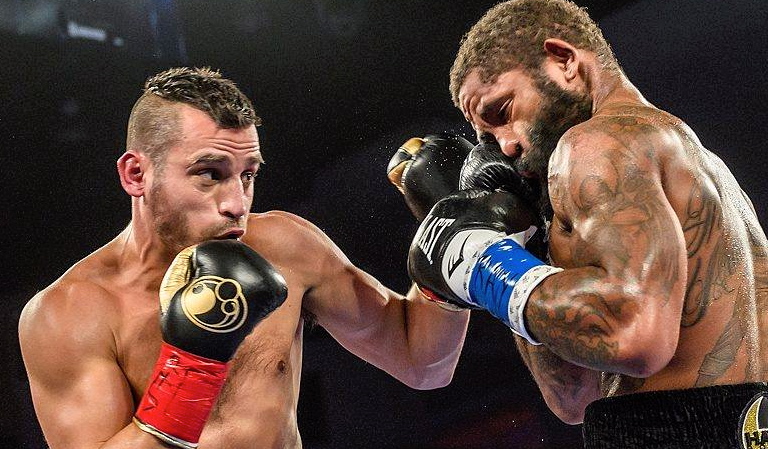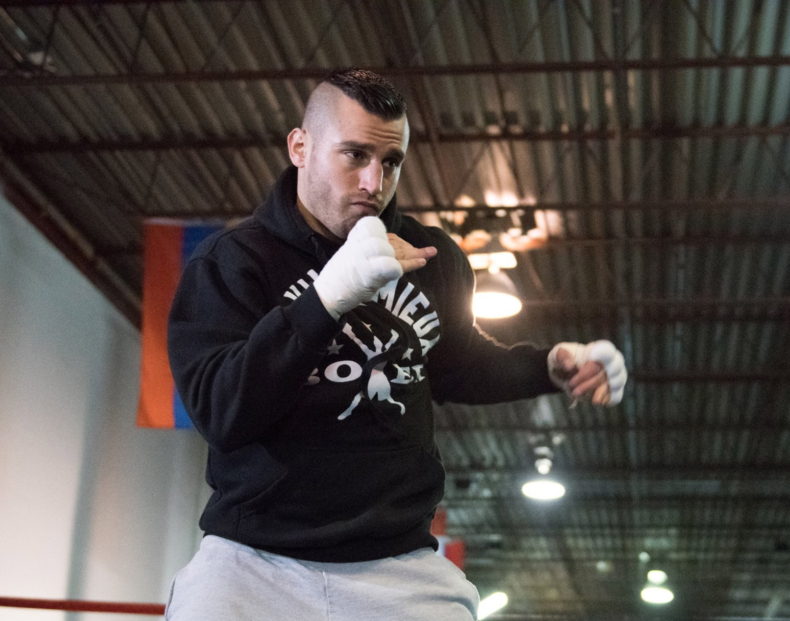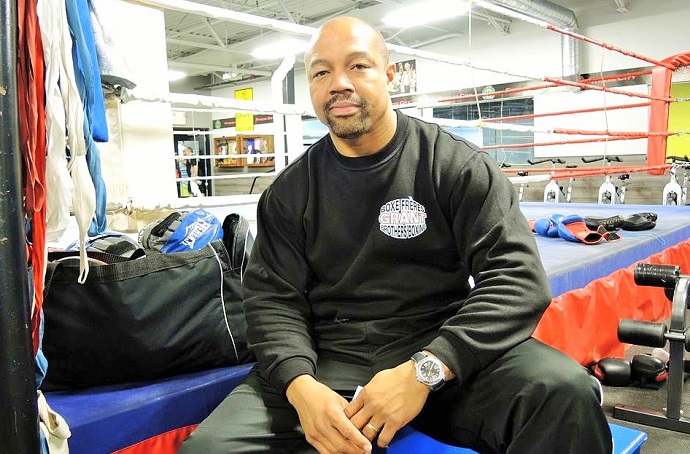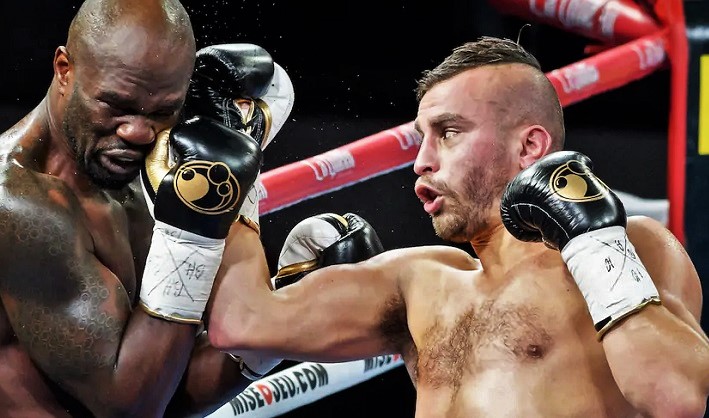Montreal Invasion On HBO
David Lemieux’s compact, cannonading left hook that detonated off the chin of fellow top contender Curtis Stevens will be replayed, relished, and winced at for the rest of 2017, and the terrifying one-punch KO of Brooklynite Stevens will surely stand up as a frontrunner for Knockout of the Year. In a fight with major crossroads stakes, Lemieux, Montreal’s beloved slugger and former IBF middleweight champion, served notice that he’s far more than an elite operator: he’s the the kind of all-action star who holds the rarified position of must-see pugilist, regardless of whether he’s a world champion.
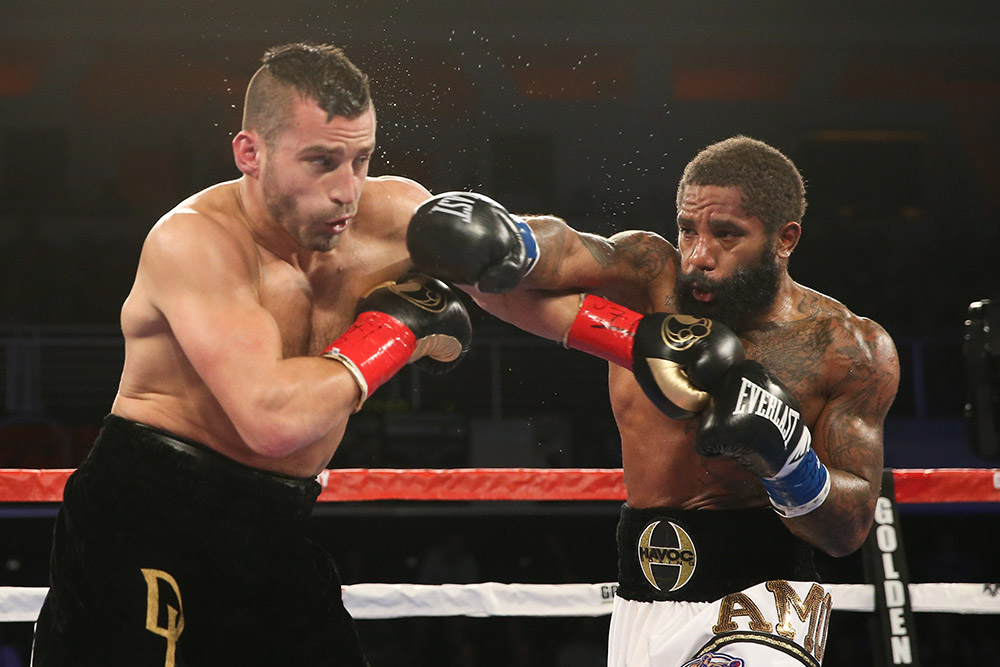
When looking at recent history, the archetype of such a fighter was the late Arturo Gatti. While no one is suggesting that Lemieux (37-3, 33 KOs) is necessarily in that rarified air, or will provide more than a fraction of the indelible moments Gatti gave us, the Montrealer remains the perfect television fighter. He combines quality skills with seemingly supernatural power; more importantly, his raw aggression, willingness to engage, and solid punch resistance allow Lemieux to turn almost every outing into a thrilling firefight for however long it lasts.
Against Stevens (29-6, 21 KOs), whose trash-talking about starting a GoFundMe campaign for the Canadian’s hospital bills ended up being chillingly ironic on multiple levels, David Lemieux proved something important about his outlook and attitude when it comes to what was potentially a make or break fight. He showed both supreme confidence and the willingness to take calculated risks in order to turn his opponent reactive and to entertain action-hungry fans. (Punch stats more than support this, too.) The sheer excitement Lemieux provides — an excitement grounded in tactics as opposed to recklessness — is a rare ability that shouldn’t be overlooked.
Watch: Highlights from @lemieuxboxing‘s round 3 KO over @AssassinStevens. #LemieuxStevens pic.twitter.com/qvziABNsfj
— HBOboxing (@HBOboxing) March 12, 2017
The only recent match where Lemieux wasn’t able to dictate tempo and apply his seek-and-destroy, swarming tactics was against Gennady Golovkin. In that fight, the Kazakh, supremely respectful of Lemieux’s punching power, turned his left shoulder outward and abused the Canadian with a sledgehammer jab. Indeed, Lemieux had no answer for how to work his way past Golovkin’s lead left, and he was ultimately outclassed. However, with more distance from that unification bout, the narrative should be less about Lemieux’s shortcomings than Golovkin’s pound-for-pound credentials.
If Gennady Golovkin is the only pugilist who has been completely able to turn David Lemieux reactive and negate his power since the Canadian matured into a a top-10 160-pounder, then any focus on Lemieux’s limitations, as opposed to the myriad positive things he has to offer, seems grossly picky and short-sighted. Sure, there’s room to debate whether Lemieux can ever have an extended world championship reign, but much of that has to with factors out of his control (i.e. the presence of a destroyer like Golovkin in his division). What cannot be denied is that Lemieux is that rare pugilist who demands undivided attention regardless of who he’s facing.
If HBO is fawning over David Lemieux and eager to feature him again against a credible middleweight, the network should also be ecstatic that junior welterweight prospect Yves Ulysse Jr. has fallen into their laps. Heading into his fight against fellow undefeated prospect Zachary Ochoa, Ulysse (13-0, 9 KOs) was a complete unknown in the United States. Ochoa (16-1, 7 KOs), a decorated amateur who came up via the New York scene, had literally zero answers for anything Ulysse offered, and the Montrealer, who was a standout on the Canadian national amateur team for years, outclassed and dominated his American opponent.
In fact, a quick comparison of records and even amateur backgrounds — Ulysse fought at two world championships for Canada — should make the Canuck’s pulverizing seventh-round stoppage hardly surprising. Sure, Ochoa has skills and is tough, but anyone with rudimentary awareness of Montreal’s fight scene knows that Ulysse possesses natural gifts — blistering hand speed, cat-like agility and movement, and raw athleticism — that translate to the elite level.
Win tonight👊 I came, I said , I did https://t.co/Xl8uFP10pU
— David Lemieux (@lemieuxboxing) March 12, 2017
More importantly, much like stablemate David Lemieux, Yves Ulysse, in his first match outside of Canada and in his most pressure-packed and important test, proved able to thrive in a moment imbued with genuine magnitude. From the opening bell, Ulysse dictated the terms of every exchange and fought with an exuberance and confidence that underlined his ease under the proverbial bright lights.
Ulysse’s speed and agility advantages were stark, and his body punching was hellacious. His output was also admirable, as he set a brisk pace from the opening round, skillfully firing away with diverse combinations while always boxing with a certain degree of control. But once Ulysse badly hurt Ochoa, it was bombs away. For the last two minutes of round seven, before the fight was stopped between stanzas, Ulysse threw a seemingly inhuman volley of shots, as if he was in a video game and someone was frantically mashing buttons. His combinations seemed to blur into a tornado of power punches, and all a helpless Ochoa could do was sag against the ropes and desperately load up as his excellent chin ironically did him no favours.
With his victory, Ulysse proved beyond any doubt that he’s a legitimate prospect knocking on the door of contender status. But in terms of television friendliness, Ulysse may have made an even greater statement. There’s a star quality about Ulysse in the way he boxes with both abandon and joy. That rare combination manifests in the way he slips punches, darts in and out to launch assaults, and puts his blistering combinations together, all while mischievously grinning.
To sum up, on Saturday night in Verona, New York, a Montreal invasion occurred, and David Lemieux and Yves Ulysse’s spectacular victories came at the expense of two Brooklynites. Both Lemieux and Ulysse reaffirmed the quality of Quebec’s fight scene and demonstrated that HBO can invest in them as individual attractions. But more importantly, the way Lemieux and Ulysse won provided compelling evidence that they’ll always be pugilists suited to fans and power brokers looking for compelling match-ups and spectacular performances, not hollow brands.
— Zachary Alapi

